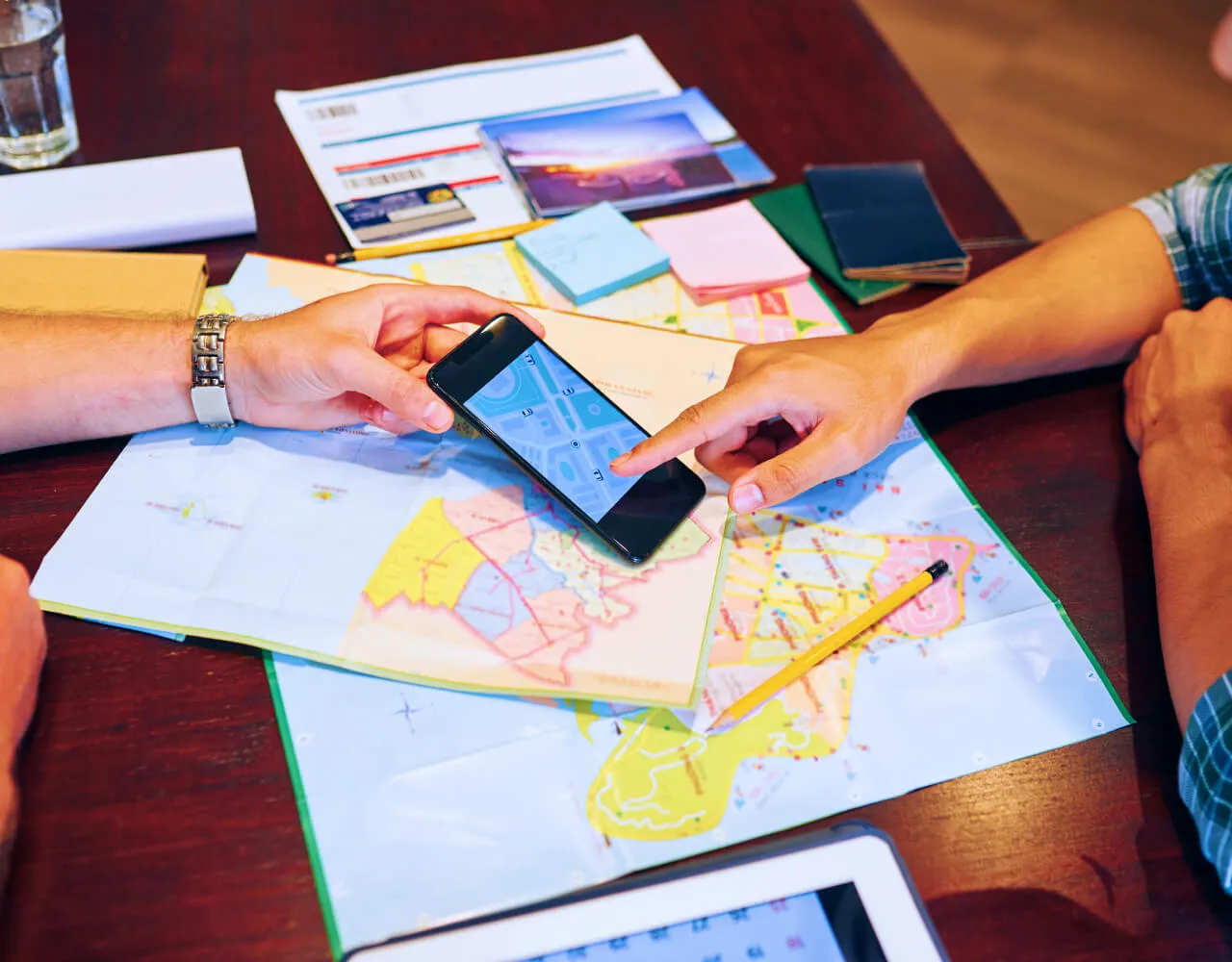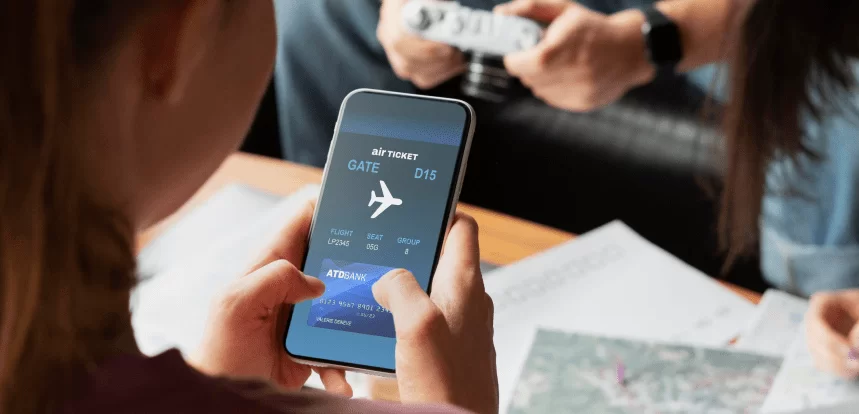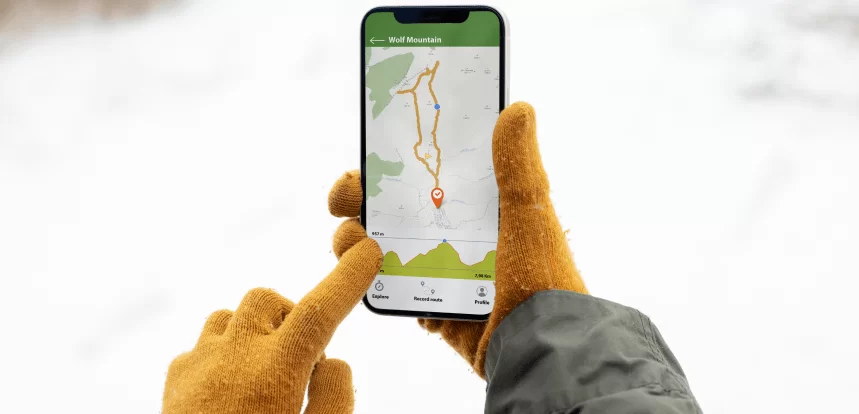Experience top-notch travel app development solutions tailored to your specific requirements, delivered by our expert teams. We prioritize seamless user experiences and innovative features in our tours and travel software solutions.

Get a robust platform for consistent revenue generation and a convenient experience in the travel industry.
Manage travel operations effectively with dynamic applications that provide valuable insights and personalized recommendations.
Tackle common challenges faced in the travel industry and offer a comprehensive travel experience to your end users.
Streamline the flight booking process and provide real-time updates for your travelers.
Simplify hotel reservations and enhance the user experience for your clients.
Make vacation planning effortless and provide an all-in-one solution for memorable travel experiences.
Access extensive airline and hotel data, real-time pricing, and advanced booking capabilities to stay competitive in the travel industry.
Begin your transformative journey with our cutting-edge tech expertise.

With a legacy of crafting robust, interactive, and efficient travel-centric applications, our 650+ strong developer team is committed to elevating your travel business.
Catering to startups, product companies, and established enterprises alike, we focus on delivering innovative, technology-driven solutions specifically built for the travel industry.
From startups to big enterprises, development
From startups to big enterprises, development
From startups to big enterprises, development
From startups to big enterprises, development
From startups to big enterprises, development
From startups to big enterprises, development
From startups to big enterprises, development
Harness our tailored solutions to stand out in the competitive travel market.


Travel apps cater to various needs and preferences of travelers, offering a wide range of functionalities and features. Here are some common types of travel apps:
Itinerary Planning Apps: Itinerary planning apps help users organize their travel plans by creating day-by-day schedules, including flights, accommodations, activities, and reservations.
Local Transportation Apps: Local transportation apps provide information on public transportation options, such as buses, trains, and subways in various cities.
They offer route planning, schedules, and fare details, making commuting easier for travelers.
Travel Expense Tracker Apps: These apps help users track and manage their travel expenses, including flights, accommodations, meals, and other costs.
They provide insights into spending patterns and assist in budgeting for future trips.
Travel Safety Apps: Travel safety apps offer features like emergency contact numbers, safety alerts, and local safety tips. They provide travelers with essential information and guidance to ensure their well-being during their trips.
Flight Booking Apps: These apps allow users to search for, compare, and book flights from multiple airlines. They provide real-time updates on flight status, offer seat selection, and facilitate secure payment transactions.
Hotel Booking Apps: Hotel booking apps enable users to browse and book accommodations based on location, preferences, and budget. They provide information on room availability, amenities, and guest reviews, making finding and booking the perfect stay easy.
Car Rental Apps: Car rental apps allow users to rent vehicles for their travel needs. Users can search for available cars, compare prices, and book rentals conveniently.
These apps often include features like GPS navigation and roadside assistance.
Vacation Rental Apps: Vacation rental apps offer a platform for users to discover and book vacation homes, villas, and apartments. They provide many options, allowing travelers to find unique and cost-effective accommodations.
Travel Guide Apps: Travel guide apps provide comprehensive destination information, including attractions, restaurants, local tips, and maps.
They help users plan itineraries, discover hidden gems, and quickly navigate unfamiliar cities.
Language Translation Apps: These apps assist travelers in overcoming language barriers by providing translation services.
They offer real-time translations of text, voice, and even images, enabling effective communication in different languages.
To know the tips & tricks of app development, check out our guide to Android app development to create a successful travel & tour app.
Travel applications are designed to provide users with a seamless and enjoyable travel experience. Here are some key features commonly found in travel applications:
Maps & Navigation: Travel applications often include maps and navigation features, assisting users in finding their way in unfamiliar locations.
They provide directions, suggest nearby attractions, and offer offline access to maps for convenience.
Flight & Hotel Search: Travel applications allow users to search for and compare flights and hotel accommodations based on travel preferences, dates, and budget.
They provide comprehensive results and real-time availability, enabling users to make informed decisions.
Booking & Reservations: These applications facilitate secure booking and reservations for flights, hotels, car rentals, and other travel services.
Users can easily select and confirm their choices within the app without visiting multiple websites or contacting the service provider.
Trip Planning & Itinerary Creation: These apps enable users to plan their trips by creating detailed itineraries. Users can add flights, hotels, activities, and other reservations, ensuring a well-structured and organized travel schedule.
Real-Time Travel Updates: Travel apps help users get real-time updates on flight delays, gate changes, and other travel-related information.
This feature helps travelers stay informed and make necessary adjustments to their plans.
Reviews & Recommendations: Users can access reviews and recommendations from fellow travelers within travel apps.
This feature helps users make informed decisions about accommodations, restaurants, and attractions, enhancing their overall travel experience.
Language Translation: Travel applications with language translation features help users overcome language barriers.
These apps offer text, voice, and image translations, facilitating communication with locals and ensuring smooth interactions.
Travel Insurance Integration: Some travel apps offer integration with travel insurance providers. Users can easily purchase travel insurance policies through the app, ensuring peace of mind and protection during their journeys.
By incorporating these features, travel apps enhance the overall travel journey and provide a seamless and enjoyable experience.
Integrating travel apps with booking and third-party APIs (Application Programming Interfaces) brings users new functionality and convenience.
Here’s how this integration enhances the travel experience:
Streamlined Booking Process: By integrating with booking APIs, travel apps provide users with a seamless booking experience.
Users can search for flights, hotels, car rentals, and other services directly within the app, comparing options and prices from various providers.
Real-Time Availability & Pricing: Integration with third-party APIs allows travel apps to access real-time information on availability, prices, and promotions.
This ensures that users can access the most up-to-date and accurate data, enabling them to make informed decisions and secure the best deals.
Expanded Inventory & Options: Third-party APIs offer access to a vast inventory of flights, accommodations, and other travel services.
By integrating with these APIs, travel apps can provide users with a wide range of options, ensuring they find the most suitable choices that align with their preferences and budget.
Value-Added Services: Integration with third-party APIs enables travel apps to offer additional services such as travel insurance, car services, activity bookings, etc.
Users can conveniently access and add these services to their itineraries within the app, enhancing their overall travel experience and reducing the need to use multiple platforms for travel-related services.
Enhancing User Experience: Integration with booking and third-party APIs enhances the user experience by providing a unified platform that offers comprehensive travel services.
Users can manage their bookings, receive updates, and access all their travel information in one place, making planning and organizing their trips convenient and efficient.
By integrating travel apps with booking and third-party APIs, businesses can deliver a robust and comprehensive travel solution to their users.
This integration simplifies the booking process, expands the range of options, and enhances the overall user experience, making travel planning and arrangements more seamless and convenient.

Ensuring the security of a travel app is of utmost importance to protect user data and provide a safe experience.
Here are vital considerations for making a travel app secure:
Secure Data Storage: Implement robust encryption techniques to safeguard sensitive user data, including personal information and payment details.
Store user data securely on servers or utilize cloud-based solutions with solid security measures to prevent unauthorized access.
Secure Authentication: Implement specific authentication mechanisms, such as multi-factor or biometric authentication, to verify user identities and prevent unauthorized access to user accounts.
Enforce strong password policies and provide options for users to reset passwords securely.
Secure API Integrations: When integrating with third-party APIs, ensure that the APIs follow industry-standard security protocols.
Implement specific communication channels (HTTPS) and validate and sanitize incoming and outgoing data to prevent malicious attacks, such as SQL injection or cross-site scripting.
Regular Security Audits: Conduct periodic security audits and vulnerability assessments to identify and address potential security weaknesses.
Regularly update the app’s software components, libraries, and frameworks to ensure they are free from known vulnerabilities.
Payment Security: If the travel app handles payment transactions, comply with Payment Card Industry Data Security Standard (PCI DSS) requirements.
Utilize secure payment gateways and tokenization techniques to protect user payment data during transactions.
Data Privacy Compliance: Adhere to data protection regulations, such as the General Data Protection Regulation (GDPR) or relevant regional laws, to ensure the privacy and rights of users.
Obtain user consent for data collection and processing, and provide transparent privacy policies.
Secure Network Communication: Use secure network protocols (such as SSL/TLS) to encrypt data transmission between the app and the server.
Avoid transmitting sensitive data over unsecured Wi-Fi networks and educate users about potential risks.
User Permissions & Access Control: Implement granular access controls within the app to restrict user access based on roles and permissions.
Request user permissions only for necessary app functionalities and provide clear explanations to users about why specific permissions are required.
Regular Updates & Patches: Keep the travel app updated with the latest security patches and bug fixes. Promptly address any reported security vulnerabilities to ensure the app remains secure against emerging threats.
Security Awareness Training: Educate your development team and employees about best practices for secure coding, data handling, and security protocols.
Foster a security-conscious culture and provide ongoing training to mitigate potential risks.
By incorporating these security measures into developing and maintaining a travel app, businesses can instill user confidence, protect their data, and provide a secure platform for seamless travel experiences.
Travel app development continues to evolve, driven by technological advancements and changing user preferences. Here are some of the latest trends in travel app development:
Artificial Intelligence (AI) Integration: AI is revolutionizing the travel industry.
Augmented Reality (AR) & Virtual Reality (VR): AR and VR technologies transform how users experience destinations.
Voice Search & Voice-Activated Assistants: Voice-based interactions are gaining popularity in travel apps.
Blockchain for Secure Transactions: Blockchain technology is being explored for secure and transparent transactions within travel apps.
Mobile Wallet Integration: Travel apps integrate mobile wallet solutions to offer seamless and secure payment options.
Personalization & Machine Learning: Travel apps utilizing machine learning algorithms to analyze user preferences and behavior.
Social Media Integration: Travel apps integrate social media platforms to facilitate social sharing, reviews, and user-generated content.
Sustainable & Eco-Friendly Travel: With growing awareness of sustainable travel, apps focus on eco-friendly features.
Contactless and Mobile Check-In: Travel apps are embracing contactless technologies, allowing users to check in digitally and access boarding passes, hotel room keys, and other travel documents on their mobile devices.
User-Generated Content and Reviews: Travel apps prioritize user-generated content by integrating reviews, ratings, and recommendations from fellow travelers.
By incorporating these latest trends, travel apps can deliver innovative and personalized experiences to users, making their travel planning and journey more efficient, enjoyable, and memorable.
Travel and tour apps offer various monetization options to generate revenue and sustain operations.
Here are some common monetization strategies employed by travel and tour apps:
In-App Advertising: Travel apps can display targeted advertisements within their interfaces. Advertisers can promote travel-related products, services, or destinations, and app owners earn revenue through ad clicks or impressions.
Affiliate Marketing: By partnering with travel agencies, airlines, hotels, and other travel service providers, travel apps can earn commissions for each successful referral or booking made through their platform.
Affiliate marketing allows apps to monetize their user base and leverage their influence in the travel industry.
Premium Features and Subscriptions: Travel apps can offer premium features or subscription-based models, where users pay a recurring fee to access exclusive functionalities or enhanced services.
These features include advanced trip planning tools, personalized recommendations, and priority customer support.
In-App Purchases: Travel apps can offer additional services or content for purchase within the app. This could include access to premium travel guides, offline maps, exclusive travel experiences, or discounted offers from partner vendors.
Sponsored Content and Partnerships: Travel apps can collaborate with travel brands, tourism boards, or local businesses to promote sponsored content or partnerships.
This may include featuring specific destinations, hotels, or activities in exchange for sponsorship or promotional deals.
Data Monetization: Travel apps can anonymize and aggregate user data to provide insights and trends to travel industry stakeholders.
By selling data to research firms, advertisers, or destination marketers, apps can generate revenue while maintaining user privacy.
In-App Bookings and Transactions: Travel apps can earn commissions or transaction fees by facilitating bookings and transactions directly within the app.
This includes flight reservations, hotel bookings, car rentals, and activity reservations.
White Label Solutions: Travel apps can offer white label solutions, where they license their technology and platform to other travel businesses.
This allows third-party companies to use the app’s infrastructure under their brand, providing a revenue stream for the app owners.
Loyalty Programs and Partnerships: Travel apps can implement loyalty programs where users earn points or rewards for using the app and making bookings.
These points can be redeemed for discounts, upgrades, or exclusive offers, fostering user loyalty and potentially attracting partnerships with travel-related brands.
Data-driven Targeted Marketing: By leveraging user data and analytics, travel apps can provide targeted marketing opportunities to advertisers.
They can offer advertising packages that reach specific user segments or demographics, ensuring higher conversion rates for advertisers and increased revenue for the app.
These monetization options allow travel and tour apps to generate revenue while delivering value to their users. Combining these strategies can create a sustainable business model and support ongoing app development and maintenance.
Android app development is booming, and it doesn’t seem to be slowing down anytime soon. With an estimated 133 million
Learn MoreIt is a Travel Platform that has been used to inspire people to travel. It allows users to view and book their outings at profitable prices. Anyone can become a member of the this Travel Platform to avail benefits.
Learn more about our processes and how we work with the help of the following FAQs.
Ans. ValueCoders offers comprehensive travel app development services that utilize cutting-edge technologies and result in feature-rich applications that enhance user experience.
• Highly skilled team of travel app developers.
• End-to-end travel app development solutions.
• Using the latest technologies such as AR/VR, Blockchain, and AI.
• Feature-rich apps that enhance user engagement and experience.
Ans.The travel app development process followed by us:
Step 1: Gather requirements
Step 2: Design intuitive interfaces
Step 3: Implement robust backend systems
Step 4: Integrate APIs
Step 5: Conduct rigorous testing
Step 6: Deploy the app to app stores
Step 7: Provide post-launch support and maintenance
Step 8: Follow agile methodologies for transparent communication, timely delivery, and a high-quality travel app that meets your business objectives and user expectations.
Ans. The time required to develop a travel app depends on the complexity of the app and the features you want to include. Our team will work with you to understand your requirements and provide a project timeline accordingly.
Ans. The cost estimate for developing a customized travel app can vary depending on several factors, such as the app’s complexity, features, design requirements, platform compatibility, and integration with third-party APIs.
At ValueCoders, we provide customized solutions tailored to your specific needs, and the cost estimate is determined after a detailed analysis of your requirements.
We offer competitive pricing models and work closely with you to provide a transparent breakdown of costs in the travel app development process. Our team strives to deliver a cost-effective solution without compromising quality and functionality.
We are grateful for our clients’ trust in us, and we take great pride in delivering quality solutions that exceed their expectations. Here is what some of them have to say about us:
Trusted by Startups and Fortune 500 companies
We can handle projects of all complexities.
Startups to Fortune 500, we have worked with all.
Top 1% industry talent to ensure your digital success.



Let's discuss how we can bring your vision to life.